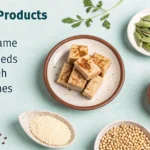Fiber is an essential nutrient that plays a crucial role in maintaining optimal digestive health. So here is a list of foods with lots of fiber. Not only does it keep us feeling full and satisfied, but it also helps regulate blood sugar levels, lowers cholesterol, and promotes regular bowel movements. However, despite its many benefits, many people do not consume enough fiber in their daily diets.

Luckily, adding more fiber to your diet is easy and delicious. In this article, we’ll explore some of the best high-fiber foods you can incorporate into your meals to help you meet your daily recommended intake.
1. Whole Grains :
Whole grains are a powerhouse of nutrition, providing an excellent source of dietary fiber and a host of essential nutrients. Unlike refined grains, whole grains retain all three parts of the grain kernel: the bran, germ, and endosperm. This complete structure contributes to their high fiber content and other nutritional benefits. Some popular whole grains include oats, quinoa, brown rice, and whole wheat bread.
Foods With Lots Of Fiber : Key Nutrients in Whole Grains
- Fiber: Whole grains are packed with dietary fiber, which is crucial for maintaining digestive health, regulating blood sugar levels, and promoting a feeling of fullness. This makes them an important component of a balanced diet, particularly for those looking to manage their weight or prevent chronic diseases such as diabetes and heart disease.
- B Vitamins: These vitamins play a vital role in energy metabolism and the proper functioning of the nervous system. Whole grains provide a good source of various B vitamins, including thiamin, riboflavin, niacin, and folate.
- Iron: Essential for the formation of hemoglobin and myoglobin, iron is critical for oxygen transport in the blood and muscles. Whole grains can contribute to maintaining adequate iron levels in the body, helping to prevent anemia and boost energy levels.
- Magnesium: This mineral is involved in over 300 enzymatic reactions in the body, including muscle and nerve function, blood glucose control, and blood pressure regulation. Whole grains are a significant source of magnesium, supporting overall health and well-being.
Foods With Lots Of Fiber : Health Benefits of Whole Grains
- Digestive Health: The high fiber content in whole grains aids in digestion by adding bulk to the stool and promoting regular bowel movements. This can help prevent constipation and reduce the risk of developing diverticular disease.
- Heart Health: Consuming whole grains has been linked to a reduced risk of heart disease. The fiber, antioxidants, and other nutrients in whole grains work together to lower cholesterol levels, reduce blood pressure, and improve overall cardiovascular health.
- Weight Management: Whole grains can help with weight management by promoting satiety and reducing overall calorie intake. Their fiber content slows down digestion, making you feel full longer and preventing overeating.
- Blood Sugar Control: The complex carbohydrates in whole grains are digested more slowly than refined grains, leading to a gradual release of glucose into the bloodstream. This helps to stabilize blood sugar levels and can be particularly beneficial for individuals with diabetes or insulin resistance.
Foods With Lots Of Fiber : Incorporating Whole Grains into Your Diet
To reap the benefits of whole grains, consider incorporating a variety of these foods into your daily diet. Here are some simple ways to do so:
- Breakfast: Start your day with a bowl of oatmeal or a slice of whole wheat toast. You can also try quinoa porridge or a whole grain breakfast cereal.
- Lunch: Opt for a sandwich made with whole wheat bread, or add cooked quinoa or brown rice to your salad.
- Dinner: Serve whole grains as a side dish, such as brown rice, barley, or farro, alongside your main course. Whole grain pasta is another excellent option.
- Snacks: Keep whole grain crackers, popcorn, or homemade granola bars on hand for a nutritious snack.
2. Foods With Lots Of Fiber : Fruits and Vegetables :

Fruits and vegetables are naturally high in fiber and should be a staple in any healthy diet. Some of the best sources of fiber include berries, apples, pears, bananas, broccoli, Brussels sprouts, and carrots. These foods are also low in calories and high in vitamins and minerals, making them an excellent choice for overall health.
3. Foods With Lots Of Fiber : Legumes :
Legumes are a family of plants that includes beans, lentils, and peas. They are high in both fiber and protein, making them an excellent addition to any vegetarian or vegan diet. Some popular legumes include black beans, chickpeas, kidney beans, and lentils. They are also a great source of iron, folate, and other essential nutrients.
4. Foods With Lots Of Fiber : Nuts and Seeds :
Nuts and seeds are a delicious and convenient way to add more fiber to your diet. They come in a variety of flavors and textures, making them an excellent addition to meals and snacks. Some of the best sources of fiber among nuts and seeds include almonds, chia seeds, flax seeds, and pumpkin seeds. These nutrient-dense foods are not only high in fiber but also packed with healthy fats, protein, and a host of other essential nutrients that contribute to overall health and well-being.
Almonds
Almonds are a versatile and popular nut that can be enjoyed on their own or added to a variety of dishes. A one-ounce serving of almonds contains about 3.5 grams of fiber. They are also rich in vitamin E, magnesium, and antioxidants, which help protect your cells from damage and support heart health.
Chia Seeds
Chia seeds are tiny but mighty when it comes to fiber content. Just one ounce (about two tablespoons) of chia seeds provides a whopping 10 grams of fiber. These seeds are also an excellent source of omega-3 fatty acids, which are beneficial for heart and brain health. Chia seeds can be easily incorporated into your diet by adding them to smoothies, yogurt, or oatmeal, or by using them to make chia pudding.
Flax Seeds
Flax seeds are another great source of fiber, with one tablespoon providing around 2.8 grams. They are also high in lignans, which have antioxidant properties, and omega-3 fatty acids. Ground flax seeds are easier for your body to digest and can be added to baked goods, cereals, or salads.
Pumpkin Seeds
Pumpkin seeds, also known as pepitas, are not only a good source of fiber (about 1.1 grams per ounce) but also rich in magnesium, iron, and zinc. These seeds make a tasty and nutritious snack and can be sprinkled on salads, soups, or yogurt for added crunch and nutrition.
5. Bran :
Bran is the nutrient-rich outer layer of grains such as wheat, rice, and oats. This often-overlooked part of the grain is an excellent source of dietary fiber, providing over 2 grams of fiber in just one tablespoon. Incorporating bran into your diet is simple and versatile; you can sprinkle it on your cereal, mix it into your oatmeal, or blend it into your smoothie. By adding bran to your meals, you can easily and deliciously increase your fiber intake, promoting better digestion and overall health.
Consuming a diet rich in fiber is essential for maintaining optimal health. By incorporating more high-fiber foods into your meals, you can help promote regularity, lower cholesterol, and reduce your risk of chronic diseases such as diabetes and heart disease. So, next time you’re planning your meals, make sure to include plenty of whole grains, fruits and vegetables, legumes, nuts and seeds, and bran to ensure you’re getting enough fiber.





